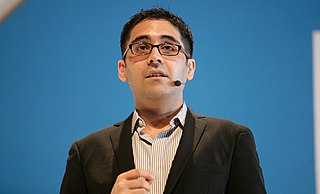A Quote by Jay McInerney
Your heartbreak is just another version of the same old story.
Related Quotes
A good story isn't the one that shuts everyone down and sort of leaves them in silent awe. A good story is one that, even before you finish the anecdote, you can see their eyes shining because it has so resonated with something from their own lives that everyone in the group has a version of the same story and they cannot wait to tell it, and that they're going to compete to make their version even more extreme than your version. So your version is just a seed.
If the point of life is the same as the point of a story, the point of life is character transformation. If I got any comfort as I set out on my first story, it was that in nearly every story, the protagonist is transformed. He's a jerk at the beginning and nice at the end, or a coward at the beginning and brave at the end. If the character doesn't change, the story hasn't happened yet. And if story is derived from real life, if story is just condensed version of life then life itself may be designed to change us so that we evolve from one kind of person to another.
Follow your passion, we’re often told. But how do you find your passion? Let me put it another way: what is it that breaks your heart about the world? It’s there that you begin to find what moves you. If you want to find your passion, surrender to your heartbreak. Your heartbreak points towards a truer north — and it’s the difficult journey towards it that is, in the truest sense, no mere passing idyllic infatuation, but enduring, tempestuous passion.
I had wanted to make this film [Suffragette] for over a decade. There has never been a cinematic rendition of this story. I had not been taught any of the history of the movement at school, and the version I had gleaned had been the Mary Poppins story of women in large hats, petitioning. There was another version.
When you're in the middle of it, when you're a kid growing up, you don't think, 'This is my first heartbreak.' You just think, 'My heart is broken.' But then as a parent, you look back, and you see your child go through his or her first heartbreak, and you're realizing, 'Oh my God, this is her first heartbreak.'
The best time to tell your story is when you have to tell your story. When it's not really a choice. But then, when you get that first, messy, complicated version down, you have to read it over and be very tough on yourself and ask, 'Well what's the story here?' If you're lucky enough to have someone you trust looking over your shoulder, he or she can help you if [you] lack perspective on your own story.
The Greeks used to use the same stories, the same mythology, time after time, different authors. There was no premium placed upon an original story, and indeed, Shakespeare likewise. A lot of people wrote plays about great kings. They didn't expect a brand-new story. It was what that new author made of the old story. It is probably the same now. We disguise it by inventing what seem to be new stories, but they're basically the same story anyway.
When I was approached for the Kannada version of the film, the makers said it would be their version of 'The Dirty Picture,' based on the life of Silk Smitha. So, I asked them for the exact story. But, I was shocked after hearing the complete story. It was neither like the Bollywood version, nor about the life of Silk Smitha.
If you keep hearing the same thing over and over again from your fan base, you should pay attention to that. But that's just another bunch of loud voices in your ear. I would imagine it makes it very hard to stay in touch with your own gut. You try to think of it as just another episode, but that never works. It just isn't.






































